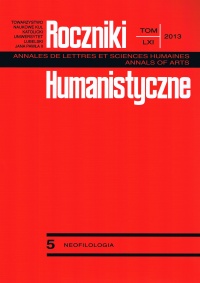Romance as a Remedy for History: Robert McLiam Wilson’s Eureka Street
Abstract
The article analyses the 1996 novel Eureka Street by the Northern Irish writer Robert McLiam Wilson as an example of historical novel discussed in the context of its evolution influenced by the developments in the theory of historiography. Set in the 1990’s Belfast, the novel is both a panorama of the Northern Irish society divided religiously and politically, and a satire on Northern Irish reality and politics. Most importantly, however, it is a romance, which constitutes the generic dominant of the novel and which on the one hand locates it in the venerable tradition of historical romance à la Walter Scott, and on the other introduces essential modifications. The most important of them is the changed concept of history, whose elevated status of an explicatory, unified metanarrative is substituted with several micro-histories; important, too is metafiction which exposes the inevitable constructedness of any historical narrative, both academic and fictional; and the shift of accents from history to romance and love, both presented as a remedy for the traumatic past. Discussing various concepts of the sublime, the essay argues that Wilson’s novel defines it in a different way: the sublime of history perceived as chaos and terror is substituted in the novel with the sublime of love perceived as order and beauty, thus providing hope for the overcoming of the past, its religious and political divisions, and hate.
References
Barron, W. R. J. English Medieval Romance. London: Longman, 1987.
Bohuszewicz, Paweł. Gramatyka romansu. Polski romans barokowy w perspektywie narratologicznej. Toruń: Wydawnictwo Naukowe Uniwersytetu Mikołaja Kopernika, 2009.
Bradbury, Malcolm. The Modern British Novel. Harmondsworth: Penguin, 1994.
Cawelti, John G. Adventure, Mystery, and Romance. Formula Stories as Art and Popular Culture. Chicago: U. of Chicago P., 1976.
Elam, Diane. Romancing the Postmodern. London: Routledge, 1992.
Elias, Amy J. Sublime Desire. History and Post-1960s Fiction. Baltimore: The Johns Hopkins UP, 2001.
Elices Agudo, Juan Francisco. “Trespassing Boundaries: Robert McLiam Wilson’s Satirical Transgression in Eureka Street.” Atlantis 24 (2002): 85-94.
Fowler, Alastair. “Transformations of Genre.” Modern Genre Theory. Ed. David Duff. London: Longman, 2000. 232-249.
Frye, Northrop. Anatomy of Criticism. 1957. Princeton: Princeton UP, 2000.
Hansson, Heidi. Romance Revived. Postmodern Romances and the Tradition. Uppsala: Swedish Science Press, 1998.
Hutcheon, Linda. The politics of Postmodernism. London: Routledge, 1991.
Kirkland, Richard. “Bourgeois Redemptions: the Fictions of Glenn Patterson and Robert McLiam Wilson.” Contemporary Irish Fiction. Themes, Tropes, Theories. Ed. Liam Harte and Michael Parker. Houndmills: Macmillan, 2000. 213-231.
Lyotard, Jean-François. “Answering the Question: What Is Postmodernism?”. In Innovation/ Renovation. Ed. Ihab Hassan and Sally Hassan. Madison: U of Wisconsin P, 1983. 71-82.
Malcolm, David. That Impossible Thing. The British Novel 1978-1992. Gdańsk: Wydawnictwo Uniwersytetu Gdańskiego, 2000.
McLiam Wilson, Robert. Eureka Street. 1996. London: Vintage, 1998.
Strehle, Susan and Mary Paniccia Carden (eds.). Doubled Plots. Romance and History. Jackson: UP of Mississippi, 2003.
Rabine, Leslie W. Reading the Romantic Heroine: Text, History, Ideology. Ann Arbor: U of Michigan P, 1985.
Copyright (c) 2013 Roczniki Humanistyczne

This work is licensed under a Creative Commons Attribution-NonCommercial-NoDerivatives 4.0 International License.





